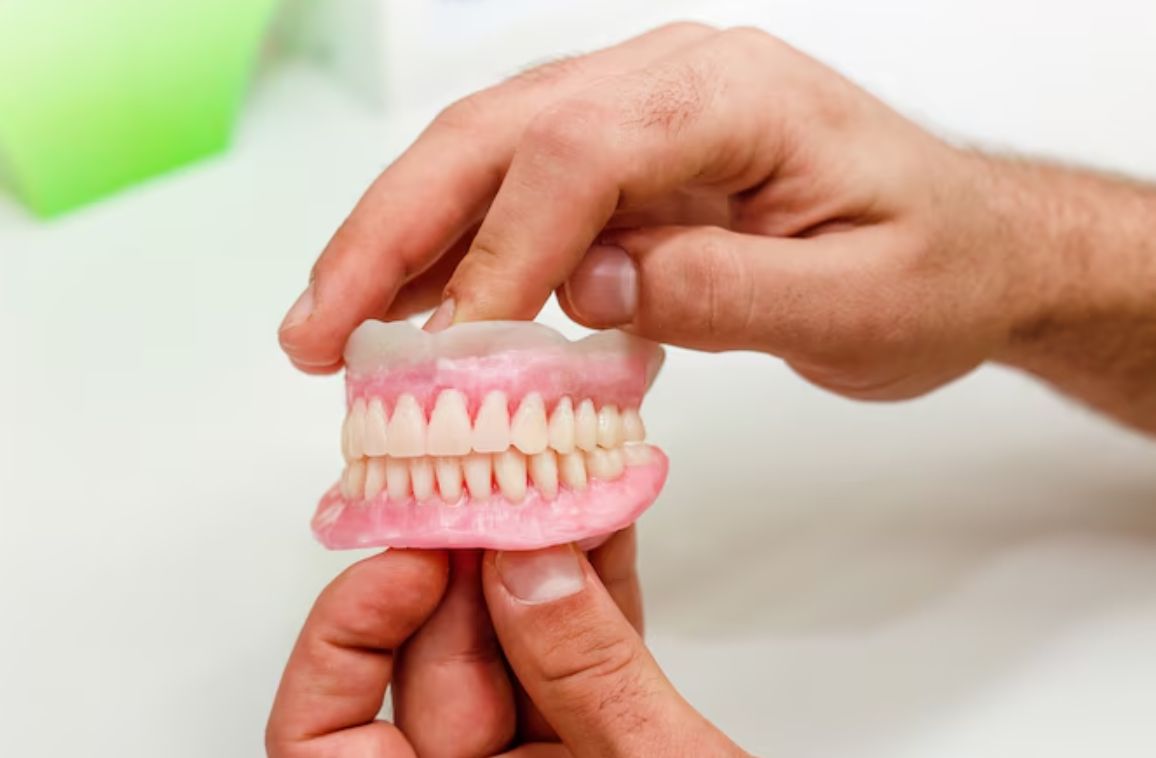Dentures are removable oral appliances that replace missing teeth. There are several types of dentures, including full, partial, and implant-supported dentures. With proper care and maintenance, the average lifespan of a denture is seven to 10 years.
What are dentures?
Dentures are removable oral appliances that are often designed to replace missing teeth. They do help restore the ability to eat and speak more clearly and improve the overall facial appearance by preventing the sagging of facial muscles. People ask, What are dentures? After all, they have to use them regularly.
Dentures (artificial teeth) are indeed synthetic replacements for missing natural teeth. A few dentures do replace a few missing teeth. Others tend to replace all the teeth, gums, and surrounding tissues.
Dentures are designed to help fill out one’s facial profile and also improve one’s appearance. They also make it easier to eat, chew, and speak regularly.
Types of dentures:
- Full Dentures: Replace an entire arch of teeth, thus resting on the gums.
- Partial dentures: replacement of several missing teeth, can also use clasps to attach to natural teeth for stability.
- Immediate Dentures: are used immediately after tooth extraction and can be temporary or final.
- Implant-Supported Dentures: attaching to dental implants in the jawbone so that there is more stability than traditional dentures.
- Overdentures: These are supported by implants and can be removed for cleaning.
- Flexible Dentures: A comfortable alternative made from softer materials.
Benefits of dentures:
- Improved Speech: Dentures can make speech easier and clearer.
- Enhanced Nutrition: They facilitate the ability to chew and also swallow a variety of foods.
- Aesthetic Improvement: Replacing decayed or even missing teeth can prevent facial collapse and also maintain the structure of one’s face.
- Oral Health: They do help maintain proper biomechanics of the head as well as the neck.
Why do people prefer dentures?
Tooth loss, of course, is the main reason people get dentures. There are a few primary causes of tooth loss, which include:
- Periodontal disease (gum disease).
- Poor oral care.
- Tooth extraction.
- Infection.
- Severe tooth decay.
- Facial or jaw injury.
- Certain genetic diseases.
- Aging.
When to repair or replace dentures?
The person may need to repair or replace dentures when:
- The dentures are cracked, chipped, broken, missing a tooth, or even lost their shape.
- A bad smell and taste are emanating from one’s dentures.
- The person can chew or speak properly while wearing one’s dentures.
- The dentures are indeed causing pain or discomfort.
- One’s dentures are loose and do not fit well in the mouth.
- It has been more than 5 years since the last time the person had the dentures replaced.
How to Take Care of One’s Dentures?
Without proper care, dentures can no doubt easily chip or even crack. Failure to clean them regularly can lead to plaque buildup and bad breath.
Practicing proper denture care:
- At night, gently brush the dentures by using a soft denture brush and also liquid soap without microbeads (not toothpaste) to remove plaque.
- Removable dentures need to be held over the sink with a small washcloth while brushing them to avoid breaking one’s dentures if dropped into the sink, the counter, or the floor.
- Soak them in a commercial denture cleaner. In the morning, brush them, of course, again, and then wear them throughout the day.
- They can also indeed be soaked overnight in white vinegar diluted with water to remove or prevent calculus formation.
Conclusion
It is important to note that while dentures do offer several benefits, they can also come with drawbacks, like reduced chewing efficiency compared to natural teeth. Therefore, it is essential to maintain natural tooth health for as long as it is possible. For personalized advice and fitting, it is better to consult with a dental professional and get answers. What are dentures?



